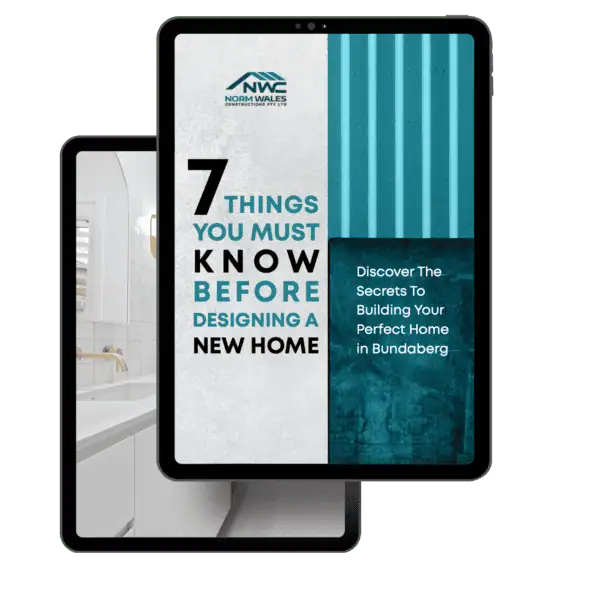The domino effect that turns simple choices into spiraling costs and blown deadlines – unless your builder helps you stay ahead of them.
When you’re planning a home, it’s completely normal to want more time before locking things in. There’s a lot to consider – the layout, the finishes, the inclusions, the numbers. And when you’re about to make some of the biggest decisions of your life, it’s only natural to want to think things through.
But there’s something that doesn’t get talked about enough:
The cost of delaying a decision once you’re inside the building process.
Because it’s not just about choosing a tap or tweaking a floor plan. Every time a decision gets pushed back, there’s a flow-on effect. It might mean a new quote. It might mean a trade gets held up. And in some cases, it can change the entire schedule of your build.
These delays don’t always feel like a big deal at the moment. But over time, they start stacking up. And before you know it, you’ve lost control of your timeline, your budget, or both.
There are two areas where these delays tend to do the most damage. And they’re often the reason a build takes longer, costs more, or ends up becoming far more stressful than it needs to be.
Problem #1: Prices Don’t Wait for You
The biggest assumption most people make is that the quote they received will hold. That if they take another week or two to decide, it won’t make much of a difference. But in reality, pricing across the building industry changes all the time. Some products hold steady for a while, others change monthly. And every now and then, we see big shifts with almost no warning.
For example, the price of concrete jumping to $22 per cubic metre, or hot water systems going up by 3.5% overnight. Even small changes, like a supplier updating their tapware or lighting range, can shift your quote just enough to throw things off balance.
The hard part is that none of these changes happen in isolation. If your choices aren’t finalised when those changes hit, your builder has no way to secure the pricing that was originally quoted. And by the time you’re ready to go, the numbers have moved.
In practice, this means you might need to reselect something that was already sorted, or allow for extra cost that wasn’t in your original budget. It’s frustrating. It slows things down. And it’s something that could’ve been avoided with earlier confirmation.
This doesn’t mean you have to rush through your decisions. But it does mean timing matters. Once your builder has the information they need, they can lock in orders, book trades, and keep your build on track. The longer that stays open, the more risk there is of things changing.
Not because anyone’s made a mistake, but simply because the market doesn’t sit still.
The best way to protect your budget isn’t to hold off until the last minute. It’s to work closely with your builder, get the right information early, and make sure everything is confirmed while it’s still available, and priced accordingly.
Problem #2: One Delay Creates Ten More
One of the most underestimated issues in any custom build is how easily a small delay can start to ripple outward.
You might think holding off on a decision for a day or two won’t have much impact, but behind every stage of construction is a long chain of moving parts, and once they’re in motion, they rely on each other to keep things running smoothly.
Take something as simple as delaying your cabinetry selections. That change can hold up the benchtop measurements. The delay to the benchtop pushes back the plumber. Then the plumber’s next job runs into yours, and suddenly the bathroom fit-off, which should’ve taken two days, gets bumped out by a week or more.
The same thing happens with inspections. For example, we might be lining up the plumbing inspection, the electrical, and the hot water all on the same day. That way, we can get signoff and keep things moving. But if one trade’s not ready, or if a decision hasn’t been made, we can’t complete the work. Which means we miss the inspection window and have to reschedule trades, rebook inspections, and in some cases – delay the next part of the build entirely.
This is where a lot of builds start to unravel, and it’s rarely from one big decision. It’s from the accumulation of little delays that each push the schedule a bit further out.
That’s why having a builder who keeps things moving, and who brings decisions forward when they need to be made, is so important. You don’t want to be the one holding up your own build without realising it. And you don’t want to find out too late that a missed phone call or delayed signoff has created a chain reaction you didn’t see coming.
Delays Aren’t Harmless. They’re Expensive.
Most people don’t delay things to be difficult. It’s just life. You get busy. You want to think it through. You don’t want to make the wrong call. That’s all completely understandable.
But inside a build process, delays carry real weight.
They change your numbers. They shift your schedule. They disrupt trade coordination and supplier pricing. And worst of all, they quietly steal momentum from your build, which is what makes everything feel harder down the line.
The best way to avoid unnecessary stress later is to stay proactive early, make timely decisions, and work with a builder who gives you the information you need to do that confidently.
Want to Stay Ahead of These Delays and Others That Don’t Always Get Talked About?
The two issues we’ve covered here – pricing shifts and scheduling knock-ons – are the ones most people feel first. But they’re not the only ones.
In fact, some of the biggest setbacks we see happen occur before the build even starts, during the planning and pre-construction phase.
That’s why we’ve put together a short, practical guide to help you spot the risks early, and build with more confidence from the very beginning.
7 Things You Must Know Before Building a Custom Home
Inside, you’ll learn:
- What to ask when you’re reviewing plans and pricing
- Where delays usually start (and how to stay ahead of them)
- How to set your build up for fewer surprises, smoother stages, and better decisions
Grab your copy here and take the next step toward a build that runs on clarity, not second-guessing.



